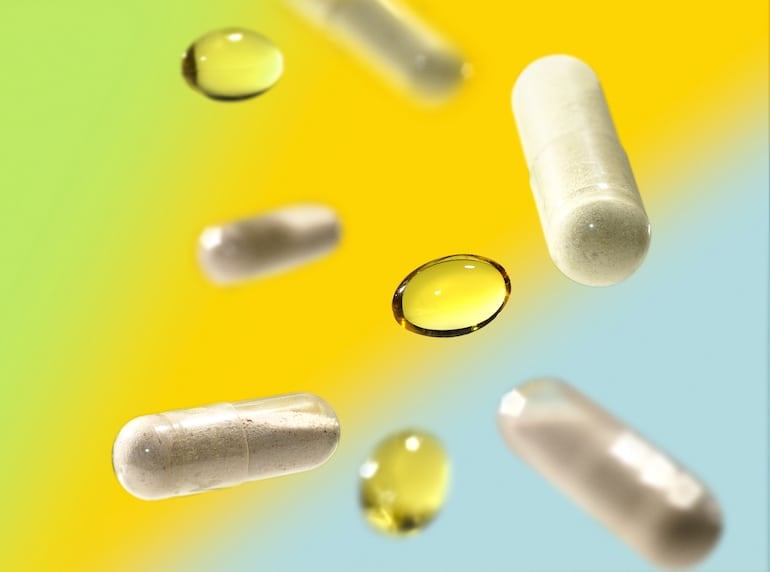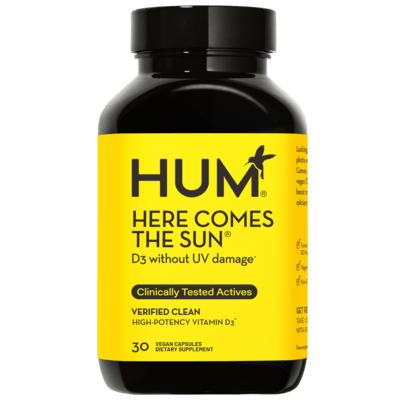How Vitamin D Supports Your Immune System
Jessica Bippen, MS, RD, discusses why vitamin D is essential to maintain a healthy immune system. Plus: countless other benefits and how to ensure you’re getting enough of it.
Vitamin D is arguably one of the most important vitamins for well-being. It plays a key role in over 3,000 gene expressions and helps regulate the health of your skin, bones, strength, and immunity. However, an estimated one billion people worldwide have a vitamin D deficiency. As you can imagine, not getting enough of this nutrient can significantly affect the way your body functions.
What is Vitamin D?
Vitamin D is a fat-soluble vitamin, meaning it can travel into your bloodstream and be stored in your body’s tissues. Also, it’s the only vitamin that the body can produce on its own, which occurs when cholesterol in your skin is exposed to ultraviolet B (UVB) rays from the sun. From there, chemical processes in your liver allow it to absorb into your blood, where it’s then directed through your tissues and into your kidneys. Finally, it turns into activated vitamin D (aka calcitriol).
Vitamin D and Your Immune System
Since vitamin D plays such an important role in an optimally functioning immune system, research shows that adults with low D levels are more likely to report having a recent cold or cough.
Research shows Vitamin D plays a role in your body’s immune response. But how does this work?
Respiratory Health
The process begins with vitamin D activating the white blood cells that are part of your body’s innate and adaptive immune response. These cells are located throughout the body, including those lining the upper and lower respiratory tract. Once these cells are activated, they’re able to fight off viruses and bacteria that can lead to such aforementioned health issues.
While many factors play a role in developing respiratory imbalances, some research indicates daily or weekly vitamin D supplementation supports respiratory health. The greatest prevention occurs in individuals very deficient in vitamin D.
immune Response
In addition to the innate and adaptive immune response activated when fighting off bacteria and viruses, new research suggests vitamin D deficiency can negatively impact heightened immune responses.

Additional Benefits of VITAMIN D
In its activated form, vitamin D supports numerous functions in your body. First, calcium and vitamin D go hand in hand. Vitamin D helps your body absorb calcium to build strong bones. Vitamin D also helps balance pH levels and can help reduce breakouts by regulating your skin’s oil production. Next, it’s been linked to improving mood.
Causes of Deficiency
The truth is that most people don’t get enough vitamin D. To reiterate, an estimated one billion people worldwide have a vitamin D deficiency. Additionally, 57 percent of Americans have low levels of vitamin D. Many lifestyle and environmental factors play a large role in these staggering statistics.
Lack of UV Exposure
The main reason more people are vitamin D deficient is that they don’t get enough exposure to sunlight. But simply getting outside more isn’t exactly the solution. Many of us live in more northern latitudes (pretty much anywhere north of Florida), where ample sunlight isn’t available year-round. Even for those who do have access to lots of sunlight, nine-to-five desk jobs usually make it challenging to spend more time indoors. Plus, the use of UV-blocking sunscreen to protect the skin and prevent accelerated aging blocks most of the vitamin D production.
Age + Skin Tone
If that wasn’t enough, as you get older, your body also reduces its natural production of vitamin D. The average 70-year-old produces significantly less vitamin D than a younger person.
Skin color makes a difference too. Individuals with dark skin produce less vitamin D than those with fair-colored skin. All things considered, you probably need to look beyond the sun to get enough vitamin D, especially if you’re older.

How to get enough Vitamin D
Taking a look at your lifestyle gives you a pretty good idea if you may be low in vitamin D. However, the only way to know for certain is to get your vitamin D levels tested by your doctor. Doing so will indicate how much you may need to supplement.
Supplements
The best way to get enough vitamin D (while still saving your skin!) is through supplements. Vitamin D supplements come in two forms, vitamin D2 and vitamin D3. Since the body produces vitamin D3, it naturally prefers this form. Typically, vitamin D2 is sourced from plants while vitamin D3 is sourced from animal-based sources. However, there are plant-based vitamin D3 supplements available sourced from lichen.
The recommended dose of vitamin D is up for debate among medical professionals. The US government currently recommends 2,000 IU’s, but even that may not be high enough for our sun-deprived population. The uppermost limit is at 4,000 IU’s per day for those who need an extra boost.
Sunshine
The most natural way to boost your vitamin D levels is by going outside for direct sunlight. However, there are a number of factors that can prevent this from being a viable option. Winter months, cold climates, and busy workdays can make the daily recommended exposure to the sun nearly impossible. Even during summer, SPF greater than eight blocks the ability of your skin to absorb vitamin D3. Consequently, it can be difficult to get the sun’s nutrients without exposing yourself to the hazards of overexposure.
Food Sources
While some foods provide decent sources of vitamin D, most don’t have enough to meet your needs. Still, that doesn’t mean you shouldn’t try to add vitamin D-rich foods to your diet. Aside from vitamin D, these foods contain many other nutrients that can benefit your health.
Some of the best food sources of vitamin D include:
- Cod liver oil (15 ml): 1,360 IU’s
- Cooked wild salmon (3.5 ounces): 360 IU’s
- Cooked mackerel (3.5 ounces): 345 IU’s
- Sardines canned in oil, drained, (1.75 ounces): 250 IU’s
- One whole egg: 20 IU’s
THE Bottom line
Vitamin D plays an important role in your overall health, including bone strength, skin health, mood, and immunity. Given vitamin D’s role in activating your immune cells, there’s a clear link between vitamin D and protecting respiratory health.
If you’re worried about low levels of vitamin D, consider supplementing or incorporating some of the lifestyle tips above.









